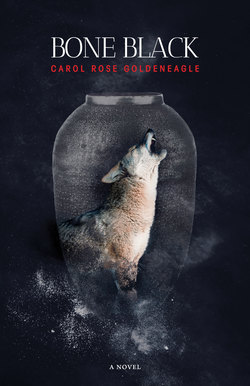Читать книгу Bone Black - Carol Rose GoldenEagle - Страница 13
На сайте Литреса книга снята с продажи.
Raven Arrives
ОглавлениеBefore loading up her bright pink carry-on luggage into the hatch of her car, Raven makes sure to include her pair of cowboy boots. They’ve been worn only once. She bought them when last year’s Calgary Stampede was in full swing. While stylish, the boots pinch her feet, so she’s giving them up. Wren can use them to decorate the fence post, along with that pair of granny boots Wren wore at their high school graduation.
Decorating the fence with footwear is a quirky tradition started by the girls’ mooshum. Their granddad was the first to hang up a pair of old boots on the fence post the year he retired. He believed the gesture was symbolic of new beginnings. He believed that displaying his trusty old footwear, the very boots that helped him make a living and raise his family, displayed his gratitude for everyone to see. “The spirits will know,” she remembers him saying. “It will make them happy and they will continue to bring good fortune.” Sure, the boots got the neighbours talking, but before long, some of those neighbours hung up old boots as well, wanting to participate in something that added character to the landscape, and maybe delivered good fortune, too.
Raven looks forward to returning to that familiar land, to take off her shoes and let her toes sink into the soft mud of the creek bed just as she and her sister did as girls. Maybe they could even look for frogs, and at night sit on the veranda and listen to crickets. As Raven reaches for her cooled tea from the cup holder of her Chrysler, she realizes she needs this return to simpler times. Life in the big city just moves too quickly, even though studying law was her choice.
“Education is the new buffalo,” their grandmother would say. Raven can hear her grandmother uttering the phrase as clearly as if she was sitting in the car with her. It’s a saying her kohkum would often repeat, especially during high school when Raven toyed with the idea of dropping out. Her grandmother would remind her that before settlers arrived, everyone in the community had a role. Each held a purpose.
It’s why she taught the girls how to harvest the land, why she passed on traditional ways of thinking: like women forming the backbone of community and family, and the a matriarchal rite of including the perspective of women in major decisions. Kohkum would talk about how white-man ways shifted this notion and caused imbalance. “That is why you need to learn,” she’d remind Raven. “Don’t let other people decide your path. We need to take care of each other, our children and our communities.”
Raven decided pursuing a career in law would become her way of doing this, but it hasn’t been easy. Lately, she’s witnessed heartbreak and testimony about how families and communities are trying to cope with losing a daughter, granddaughter or other female relative. There are harsh stories about indifference. It still bothers her that an rcmp officer once commented that, “The problem with missing and murdered Indigenous women is drunk and angry Native men.” Raven swears she would have clawed him in the face if he hadn’t promptly left the premises in his police cruiser.
Raven is taking an active part in trying to change the status quo of indifference. She remembers the name of Helen Betty Osborne so often, and it breaks her heart. Helen was a Cree teenager who was found raped and murdered in northern Manitoba in the early seventies. Everyone in The Pas, Manitoba, knows the story. The community knew what happened but no one came forward for decades. Their silence condoned the murder and protected those who caused harm. Even sitting here, driving toward a much-needed visit with her sister, Raven feels uneasy remembering what happened to Helen. She sips back the last of her tea, frustrated that almost five decades later, not much has changed.
Raven is on a mission to help families and draft recommendations, suggesting ways to prompt authorities to reopen files, re-investigate and re-examine what changes need to be made to ensure the system protects Indigenous women. There have been too many stories about women going missing or being murdered, and a system that just seems to close the case file without seeing justice. More importantly, Raven is working towards something that will reawaken a collective consciousness. Our women are sacred. Those are Kohkum’s words, and they’ve become Raven’s purpose. It’s why she looks forward to revisiting the land in the valley. She needs to spend some time in a good place and wash away negative energy with the healing waters of Last Mountain Lake. Raven was taught that natural water heals, even if it’s just a puddle after a big rainfall.
Clusters of yarrow root come to mind. Kohkum used to pick them when the twins were teenagers. Kohkum would dry the root and grind it into powder to make a tea. With the careful instruction of her grandmother, Raven learned that the delicate wildflower holds the remedy to curing menstrual cramps, easing a woman’s Moon Time, reconnecting with the gifts of Mother Earth. Raven guesses that work stress is causing her pain and a heavy flow this month. She could use some yarrow now and will suggest that the sisters take a walk on the land to look for some. She hopes Wren remembers how to gather and prepare the root because Kohkum didn’t write any of this down on paper.
